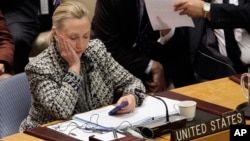Why did Hillary Clinton opt to use a private email account for official business during her tenure as secretary of state? And could this revelation really hurt her hopes of becoming the first woman president?
Those are just two of the key questions at the heart of a controversy over her use of a private email account during her time at the State Department.
Republicans are trying to fan the controversy just as Democrats were looking ahead to what they expect will be the launch of Clinton’s presidential campaign later this year.
The controversy was set off when the State Department confirmed that Clinton used a private email account for government business during her tenure as secretary of state instead of a government email address. State Department officials said using a private email account was not prohibited and that Clinton never shared classified information over the account. But critics want to know if it was a way for her to hide her communications.
On her Twitter account, Clinton said she wanted “the public to see my email” and that she asked the State Department to release them. State Department officials say the process of reviewing thousands of emails has begun but will take months.
Renewed focus on Benghazi probe
The revelation that Clinton used a private account sparked criticism from Republicans in Congress, including members of a special House of Representatives committee set up to investigate the 2012 terrorist attack on a U.S. diplomatic facility in Benghazi, Libya. U.S. Ambassador Chris Stevens and three other Americans died in the attack, and Republicans have said Clinton should have done more as secretary of state to protect them.
The committee chairman, Rep. Trey Gowdy of South Carolina, said he is eager to have access to the emails.
“Only she has a complete record and the committee is going to have to go to her and her attorneys and her email providers to ensure we have access to everything the American people are entitled to know,” he said.
The email flap unfolded just as Democrats began to eagerly anticipate Clinton announcing her candidacy for president sometime in the next few months. Clinton seemed to hint at it again this week during a speech to Emily’s List, a political group that supports women candidates.
“Don’t you want to see more women running for Congress?” Clinton asked. “And I suppose it is only fair to say, don’t you someday want to see a woman president of the United States of America?” The rest was drowned out by cheering.
Assessing the political damage
Clinton and her husband, former President Bill Clinton, have come under fire in the past for seeming to hold back information, said political analyst Larry Sabato of the University of Virginia.
“We know that they have a penchant for secrecy and that transparency often is alien to them,” he said. “Frequently they believe there are two sets of rules, one for them and one for everybody else.”
But Sabato quickly added that it’s too soon to know what impact the controversy will have on Clinton as she prepares for what many expect will be a run for president in 2016.
“The only significant political reaction to this will be if there is something explosive in the emails once they are presumably released,” he said. “If there is nothing explosive in there, this will fade away just like so many other issues that seem important at the moment.”
But other experts aren’t so sure and warn the email controversy could signal political trouble ahead for Clinton. Veteran political analyst Tom DeFrank of National Journal, who has covered both Bill and Hillary Clinton for years, spoke on VOA’s “Issues in the News” program.
“To say they have a penchant for secrecy is an understatement,” he said. “They are obsessed with secrecy and this feeds into the narrative of the Clintons always straddling a fault line between crisis and disaster. I mean this is not smart.”
Despite the flap, most analysts still see Clinton as a heavy favorite for the Democratic presidential nomination should she run, including John Fortier of the Bipartisan Policy Center in Washington.
“I think she is the strongest figure,” Frotier said. “She has a lot going for her, as she did in 2008 I might add, and that did not work out for her. What I think is certain is that she will have a challenge from her left.”
And it may be Democrats on the left who are getting political heartburn over the email flap. Recent polls show that Clinton remains by far the favorite for the Democratic Party’s presidential nomination. But this latest controversy has begun to worry some Democratic activists who may be more open to seeking an alternative to Clinton.
Among those Democrats who have indicated an interest in running next year are Vice President Joe Biden, former Maryland Governor Martin O’Malley, former Virginia Senator Jim Webb and Vermont Independent Senator Bernie Sanders. For now they are saying little about the email controversy.
